Analyzing the Impact of Recession on Side Hustles in Nigeria
VerifiedAdded on 2019/09/23
|72
|21254
|272
Project
AI Summary
This project analyzes the impact of the 2016 recession on the rise of side hustles in Nigeria. The study investigates the economic downturn's effect on employment, leading many Nigerians to pursue self-employment or side businesses. It examines the trends of side hustles, their impact on livelihoods, and whether they have improved the financial situations of Nigerians or affected their primary employment. The research includes a literature review on the Nigerian economic recession, its causes, and consequences, alongside business development and side hustle formation. The methodology involves quantitative and qualitative data analysis, including questionnaires and secondary data analysis. The findings assess the impact of the recession, suggesting how diversification can improve the Nigerian economy. Ethical considerations and research limitations are also discussed, alongside recommendations for future research and policy. The project concludes by summarizing the study's findings and offering recommendations regarding Nigeria's economic recovery.
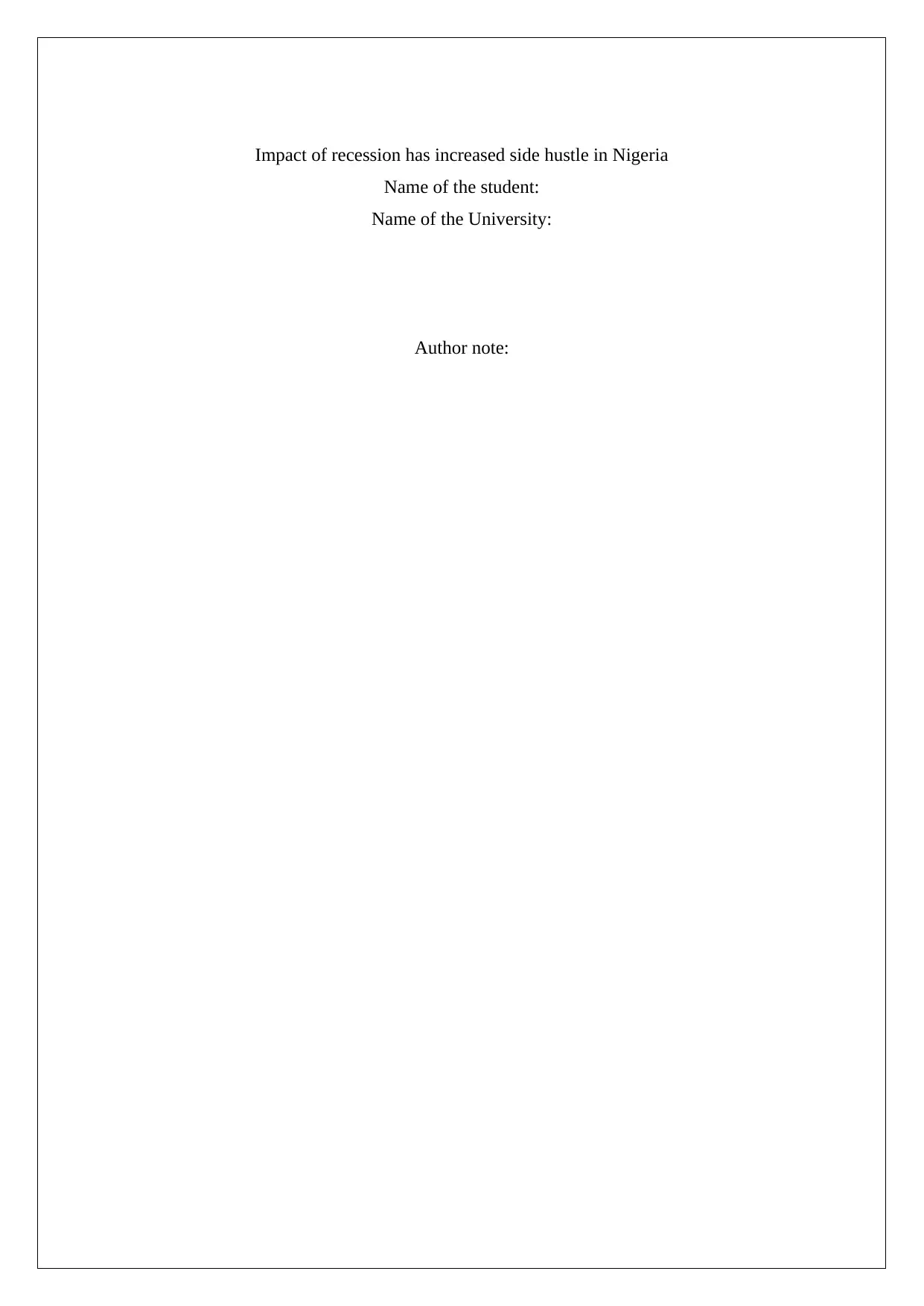
Impact of recession has increased side hustle in Nigeria
Name of the student:
Name of the University:
Author note:
Name of the student:
Name of the University:
Author note:
Paraphrase This Document
Need a fresh take? Get an instant paraphrase of this document with our AI Paraphraser
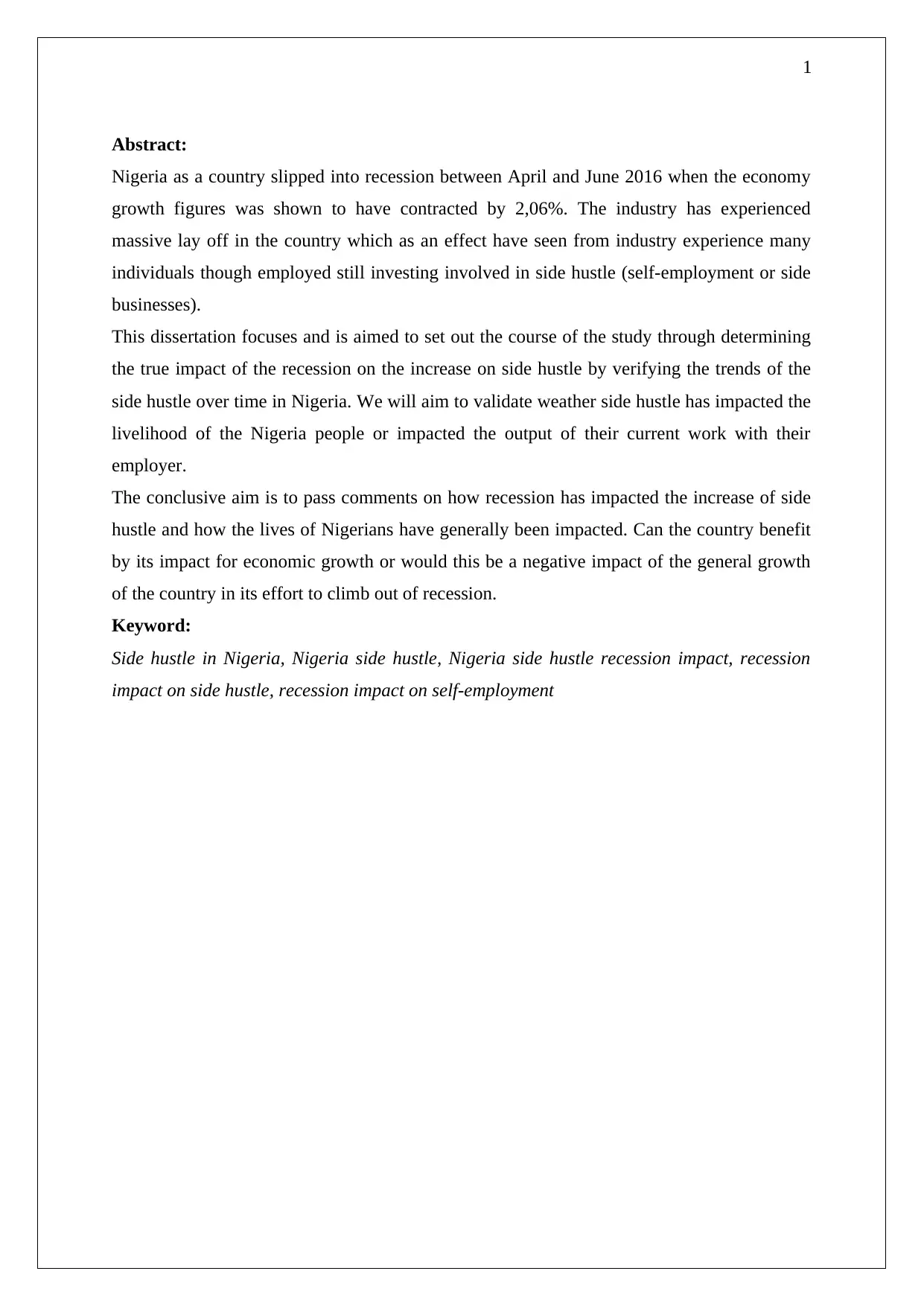
1
Abstract:
Nigeria as a country slipped into recession between April and June 2016 when the economy
growth figures was shown to have contracted by 2,06%. The industry has experienced
massive lay off in the country which as an effect have seen from industry experience many
individuals though employed still investing involved in side hustle (self-employment or side
businesses).
This dissertation focuses and is aimed to set out the course of the study through determining
the true impact of the recession on the increase on side hustle by verifying the trends of the
side hustle over time in Nigeria. We will aim to validate weather side hustle has impacted the
livelihood of the Nigeria people or impacted the output of their current work with their
employer.
The conclusive aim is to pass comments on how recession has impacted the increase of side
hustle and how the lives of Nigerians have generally been impacted. Can the country benefit
by its impact for economic growth or would this be a negative impact of the general growth
of the country in its effort to climb out of recession.
Keyword:
Side hustle in Nigeria, Nigeria side hustle, Nigeria side hustle recession impact, recession
impact on side hustle, recession impact on self-employment
Abstract:
Nigeria as a country slipped into recession between April and June 2016 when the economy
growth figures was shown to have contracted by 2,06%. The industry has experienced
massive lay off in the country which as an effect have seen from industry experience many
individuals though employed still investing involved in side hustle (self-employment or side
businesses).
This dissertation focuses and is aimed to set out the course of the study through determining
the true impact of the recession on the increase on side hustle by verifying the trends of the
side hustle over time in Nigeria. We will aim to validate weather side hustle has impacted the
livelihood of the Nigeria people or impacted the output of their current work with their
employer.
The conclusive aim is to pass comments on how recession has impacted the increase of side
hustle and how the lives of Nigerians have generally been impacted. Can the country benefit
by its impact for economic growth or would this be a negative impact of the general growth
of the country in its effort to climb out of recession.
Keyword:
Side hustle in Nigeria, Nigeria side hustle, Nigeria side hustle recession impact, recession
impact on side hustle, recession impact on self-employment
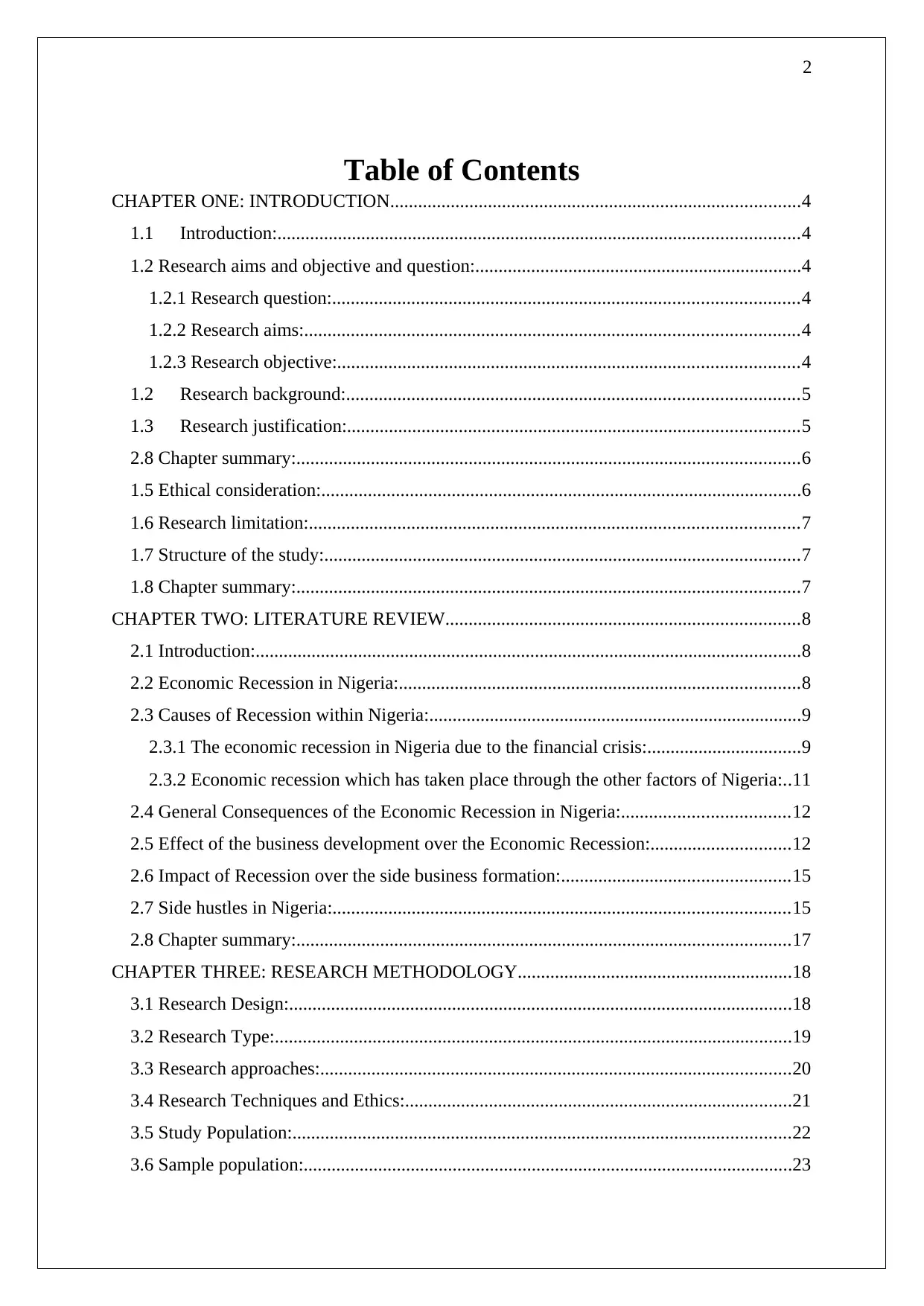
2
Table of Contents
CHAPTER ONE: INTRODUCTION........................................................................................4
1.1 Introduction:................................................................................................................4
1.2 Research aims and objective and question:......................................................................4
1.2.1 Research question:....................................................................................................4
1.2.2 Research aims:..........................................................................................................4
1.2.3 Research objective:...................................................................................................4
1.2 Research background:.................................................................................................5
1.3 Research justification:.................................................................................................5
2.8 Chapter summary:............................................................................................................6
1.5 Ethical consideration:.......................................................................................................6
1.6 Research limitation:.........................................................................................................7
1.7 Structure of the study:......................................................................................................7
1.8 Chapter summary:............................................................................................................7
CHAPTER TWO: LITERATURE REVIEW............................................................................8
2.1 Introduction:.....................................................................................................................8
2.2 Economic Recession in Nigeria:......................................................................................8
2.3 Causes of Recession within Nigeria:................................................................................9
2.3.1 The economic recession in Nigeria due to the financial crisis:.................................9
2.3.2 Economic recession which has taken place through the other factors of Nigeria:..11
2.4 General Consequences of the Economic Recession in Nigeria:....................................12
2.5 Effect of the business development over the Economic Recession:..............................12
2.6 Impact of Recession over the side business formation:.................................................15
2.7 Side hustles in Nigeria:..................................................................................................15
2.8 Chapter summary:..........................................................................................................17
CHAPTER THREE: RESEARCH METHODOLOGY...........................................................18
3.1 Research Design:............................................................................................................18
3.2 Research Type:...............................................................................................................19
3.3 Research approaches:.....................................................................................................20
3.4 Research Techniques and Ethics:...................................................................................21
3.5 Study Population:...........................................................................................................22
3.6 Sample population:.........................................................................................................23
Table of Contents
CHAPTER ONE: INTRODUCTION........................................................................................4
1.1 Introduction:................................................................................................................4
1.2 Research aims and objective and question:......................................................................4
1.2.1 Research question:....................................................................................................4
1.2.2 Research aims:..........................................................................................................4
1.2.3 Research objective:...................................................................................................4
1.2 Research background:.................................................................................................5
1.3 Research justification:.................................................................................................5
2.8 Chapter summary:............................................................................................................6
1.5 Ethical consideration:.......................................................................................................6
1.6 Research limitation:.........................................................................................................7
1.7 Structure of the study:......................................................................................................7
1.8 Chapter summary:............................................................................................................7
CHAPTER TWO: LITERATURE REVIEW............................................................................8
2.1 Introduction:.....................................................................................................................8
2.2 Economic Recession in Nigeria:......................................................................................8
2.3 Causes of Recession within Nigeria:................................................................................9
2.3.1 The economic recession in Nigeria due to the financial crisis:.................................9
2.3.2 Economic recession which has taken place through the other factors of Nigeria:..11
2.4 General Consequences of the Economic Recession in Nigeria:....................................12
2.5 Effect of the business development over the Economic Recession:..............................12
2.6 Impact of Recession over the side business formation:.................................................15
2.7 Side hustles in Nigeria:..................................................................................................15
2.8 Chapter summary:..........................................................................................................17
CHAPTER THREE: RESEARCH METHODOLOGY...........................................................18
3.1 Research Design:............................................................................................................18
3.2 Research Type:...............................................................................................................19
3.3 Research approaches:.....................................................................................................20
3.4 Research Techniques and Ethics:...................................................................................21
3.5 Study Population:...........................................................................................................22
3.6 Sample population:.........................................................................................................23
⊘ This is a preview!⊘
Do you want full access?
Subscribe today to unlock all pages.

Trusted by 1+ million students worldwide
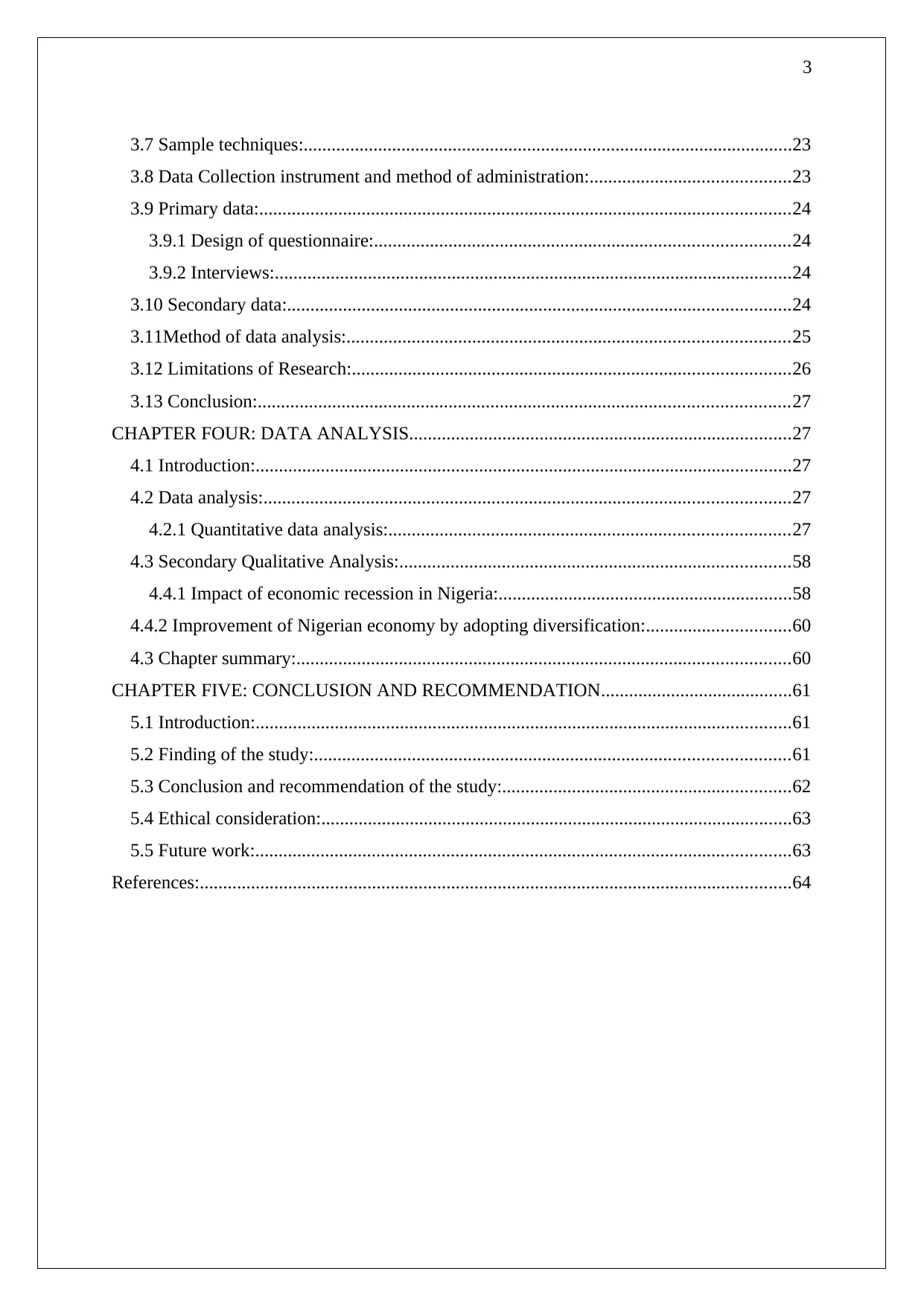
3
3.7 Sample techniques:.........................................................................................................23
3.8 Data Collection instrument and method of administration:...........................................23
3.9 Primary data:..................................................................................................................24
3.9.1 Design of questionnaire:.........................................................................................24
3.9.2 Interviews:...............................................................................................................24
3.10 Secondary data:............................................................................................................24
3.11Method of data analysis:...............................................................................................25
3.12 Limitations of Research:..............................................................................................26
3.13 Conclusion:..................................................................................................................27
CHAPTER FOUR: DATA ANALYSIS..................................................................................27
4.1 Introduction:...................................................................................................................27
4.2 Data analysis:.................................................................................................................27
4.2.1 Quantitative data analysis:......................................................................................27
4.3 Secondary Qualitative Analysis:....................................................................................58
4.4.1 Impact of economic recession in Nigeria:...............................................................58
4.4.2 Improvement of Nigerian economy by adopting diversification:...............................60
4.3 Chapter summary:..........................................................................................................60
CHAPTER FIVE: CONCLUSION AND RECOMMENDATION.........................................61
5.1 Introduction:...................................................................................................................61
5.2 Finding of the study:......................................................................................................61
5.3 Conclusion and recommendation of the study:..............................................................62
5.4 Ethical consideration:.....................................................................................................63
5.5 Future work:...................................................................................................................63
References:...............................................................................................................................64
3.7 Sample techniques:.........................................................................................................23
3.8 Data Collection instrument and method of administration:...........................................23
3.9 Primary data:..................................................................................................................24
3.9.1 Design of questionnaire:.........................................................................................24
3.9.2 Interviews:...............................................................................................................24
3.10 Secondary data:............................................................................................................24
3.11Method of data analysis:...............................................................................................25
3.12 Limitations of Research:..............................................................................................26
3.13 Conclusion:..................................................................................................................27
CHAPTER FOUR: DATA ANALYSIS..................................................................................27
4.1 Introduction:...................................................................................................................27
4.2 Data analysis:.................................................................................................................27
4.2.1 Quantitative data analysis:......................................................................................27
4.3 Secondary Qualitative Analysis:....................................................................................58
4.4.1 Impact of economic recession in Nigeria:...............................................................58
4.4.2 Improvement of Nigerian economy by adopting diversification:...............................60
4.3 Chapter summary:..........................................................................................................60
CHAPTER FIVE: CONCLUSION AND RECOMMENDATION.........................................61
5.1 Introduction:...................................................................................................................61
5.2 Finding of the study:......................................................................................................61
5.3 Conclusion and recommendation of the study:..............................................................62
5.4 Ethical consideration:.....................................................................................................63
5.5 Future work:...................................................................................................................63
References:...............................................................................................................................64
Paraphrase This Document
Need a fresh take? Get an instant paraphrase of this document with our AI Paraphraser
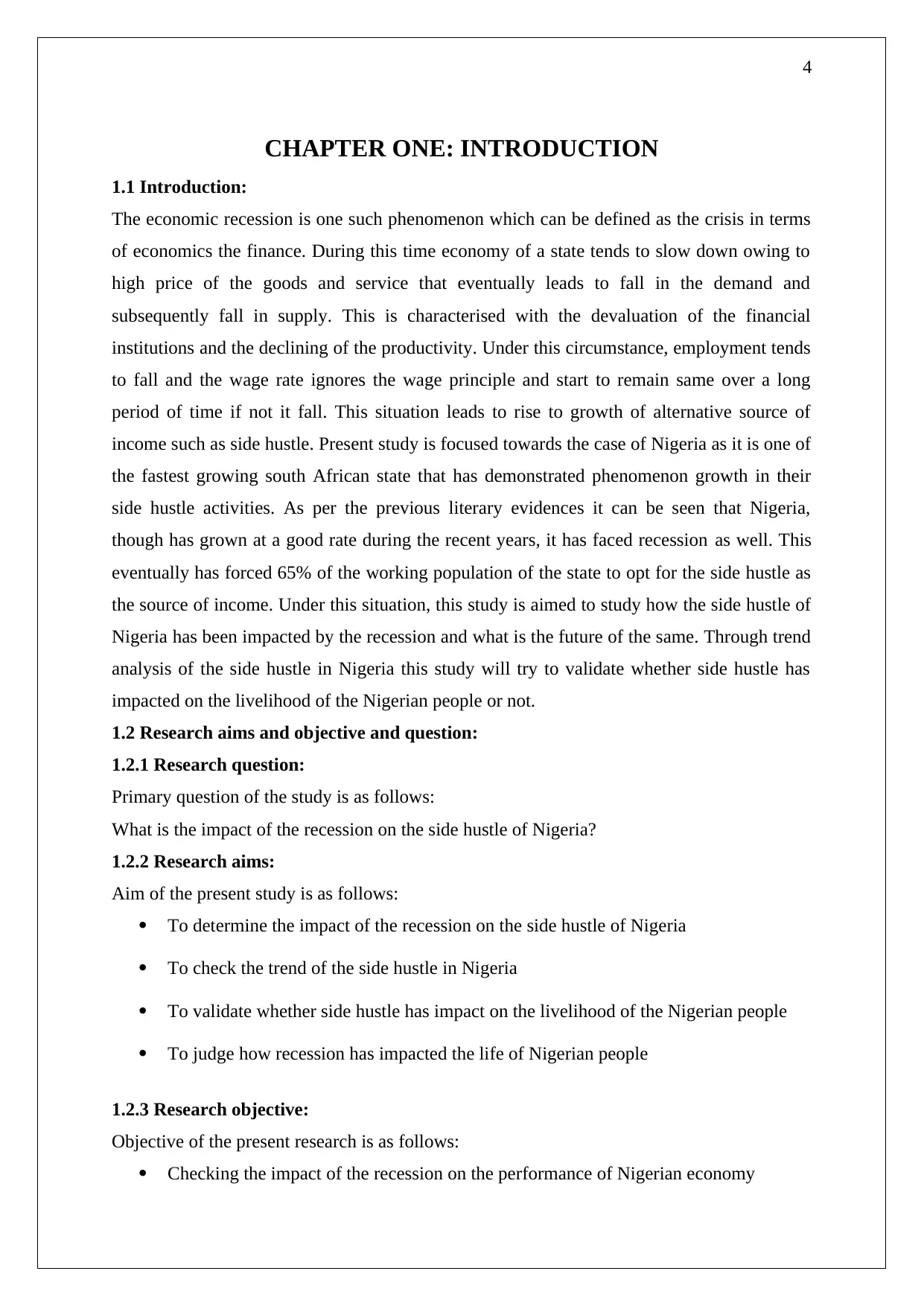
4
CHAPTER ONE: INTRODUCTION
1.1 Introduction:
The economic recession is one such phenomenon which can be defined as the crisis in terms
of economics the finance. During this time economy of a state tends to slow down owing to
high price of the goods and service that eventually leads to fall in the demand and
subsequently fall in supply. This is characterised with the devaluation of the financial
institutions and the declining of the productivity. Under this circumstance, employment tends
to fall and the wage rate ignores the wage principle and start to remain same over a long
period of time if not it fall. This situation leads to rise to growth of alternative source of
income such as side hustle. Present study is focused towards the case of Nigeria as it is one of
the fastest growing south African state that has demonstrated phenomenon growth in their
side hustle activities. As per the previous literary evidences it can be seen that Nigeria,
though has grown at a good rate during the recent years, it has faced recession as well. This
eventually has forced 65% of the working population of the state to opt for the side hustle as
the source of income. Under this situation, this study is aimed to study how the side hustle of
Nigeria has been impacted by the recession and what is the future of the same. Through trend
analysis of the side hustle in Nigeria this study will try to validate whether side hustle has
impacted on the livelihood of the Nigerian people or not.
1.2 Research aims and objective and question:
1.2.1 Research question:
Primary question of the study is as follows:
What is the impact of the recession on the side hustle of Nigeria?
1.2.2 Research aims:
Aim of the present study is as follows:
To determine the impact of the recession on the side hustle of Nigeria
To check the trend of the side hustle in Nigeria
To validate whether side hustle has impact on the livelihood of the Nigerian people
To judge how recession has impacted the life of Nigerian people
1.2.3 Research objective:
Objective of the present research is as follows:
Checking the impact of the recession on the performance of Nigerian economy
CHAPTER ONE: INTRODUCTION
1.1 Introduction:
The economic recession is one such phenomenon which can be defined as the crisis in terms
of economics the finance. During this time economy of a state tends to slow down owing to
high price of the goods and service that eventually leads to fall in the demand and
subsequently fall in supply. This is characterised with the devaluation of the financial
institutions and the declining of the productivity. Under this circumstance, employment tends
to fall and the wage rate ignores the wage principle and start to remain same over a long
period of time if not it fall. This situation leads to rise to growth of alternative source of
income such as side hustle. Present study is focused towards the case of Nigeria as it is one of
the fastest growing south African state that has demonstrated phenomenon growth in their
side hustle activities. As per the previous literary evidences it can be seen that Nigeria,
though has grown at a good rate during the recent years, it has faced recession as well. This
eventually has forced 65% of the working population of the state to opt for the side hustle as
the source of income. Under this situation, this study is aimed to study how the side hustle of
Nigeria has been impacted by the recession and what is the future of the same. Through trend
analysis of the side hustle in Nigeria this study will try to validate whether side hustle has
impacted on the livelihood of the Nigerian people or not.
1.2 Research aims and objective and question:
1.2.1 Research question:
Primary question of the study is as follows:
What is the impact of the recession on the side hustle of Nigeria?
1.2.2 Research aims:
Aim of the present study is as follows:
To determine the impact of the recession on the side hustle of Nigeria
To check the trend of the side hustle in Nigeria
To validate whether side hustle has impact on the livelihood of the Nigerian people
To judge how recession has impacted the life of Nigerian people
1.2.3 Research objective:
Objective of the present research is as follows:
Checking the impact of the recession on the performance of Nigerian economy
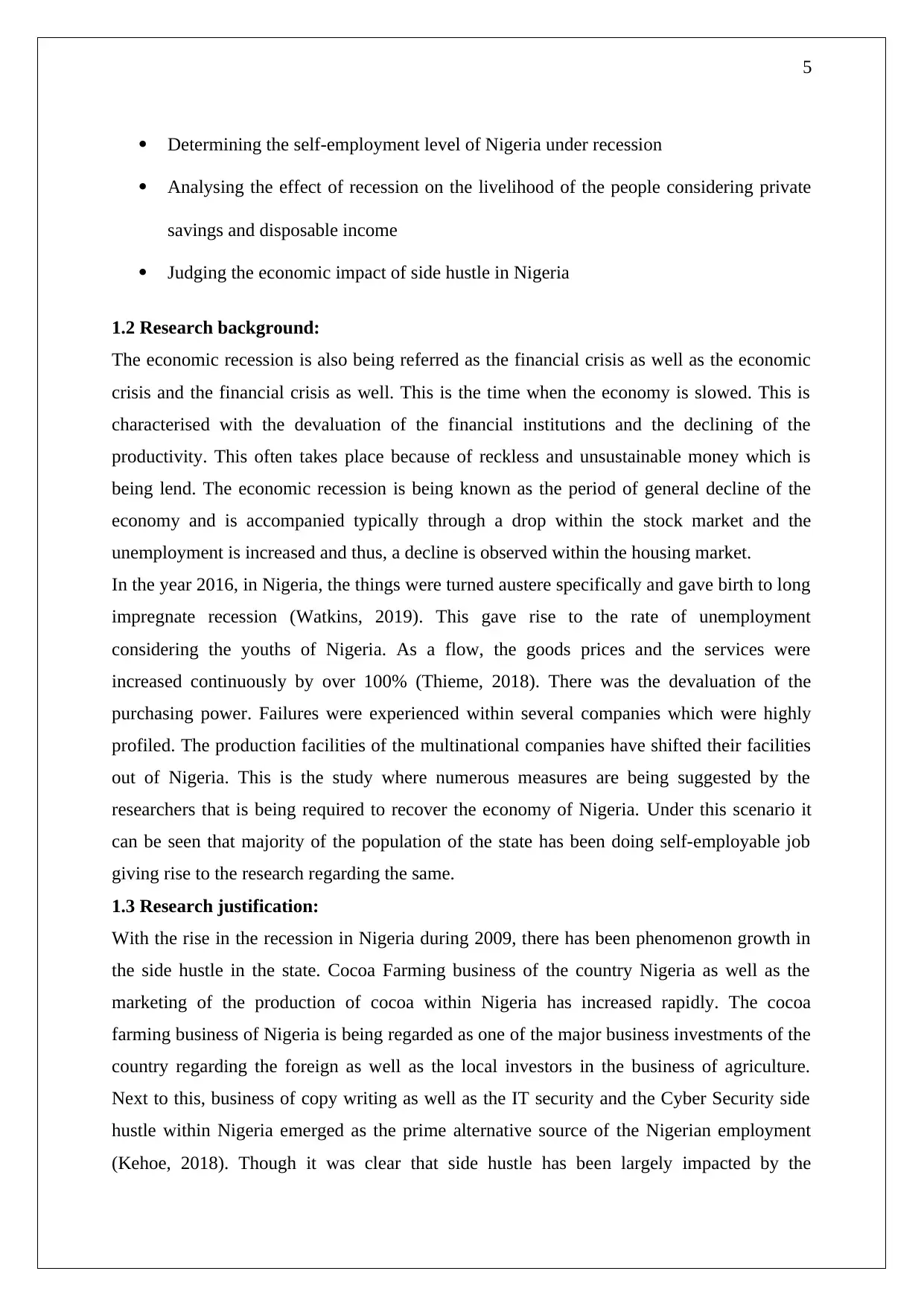
5
Determining the self-employment level of Nigeria under recession
Analysing the effect of recession on the livelihood of the people considering private
savings and disposable income
Judging the economic impact of side hustle in Nigeria
1.2 Research background:
The economic recession is also being referred as the financial crisis as well as the economic
crisis and the financial crisis as well. This is the time when the economy is slowed. This is
characterised with the devaluation of the financial institutions and the declining of the
productivity. This often takes place because of reckless and unsustainable money which is
being lend. The economic recession is being known as the period of general decline of the
economy and is accompanied typically through a drop within the stock market and the
unemployment is increased and thus, a decline is observed within the housing market.
In the year 2016, in Nigeria, the things were turned austere specifically and gave birth to long
impregnate recession (Watkins, 2019). This gave rise to the rate of unemployment
considering the youths of Nigeria. As a flow, the goods prices and the services were
increased continuously by over 100% (Thieme, 2018). There was the devaluation of the
purchasing power. Failures were experienced within several companies which were highly
profiled. The production facilities of the multinational companies have shifted their facilities
out of Nigeria. This is the study where numerous measures are being suggested by the
researchers that is being required to recover the economy of Nigeria. Under this scenario it
can be seen that majority of the population of the state has been doing self-employable job
giving rise to the research regarding the same.
1.3 Research justification:
With the rise in the recession in Nigeria during 2009, there has been phenomenon growth in
the side hustle in the state. Cocoa Farming business of the country Nigeria as well as the
marketing of the production of cocoa within Nigeria has increased rapidly. The cocoa
farming business of Nigeria is being regarded as one of the major business investments of the
country regarding the foreign as well as the local investors in the business of agriculture.
Next to this, business of copy writing as well as the IT security and the Cyber Security side
hustle within Nigeria emerged as the prime alternative source of the Nigerian employment
(Kehoe, 2018). Though it was clear that side hustle has been largely impacted by the
Determining the self-employment level of Nigeria under recession
Analysing the effect of recession on the livelihood of the people considering private
savings and disposable income
Judging the economic impact of side hustle in Nigeria
1.2 Research background:
The economic recession is also being referred as the financial crisis as well as the economic
crisis and the financial crisis as well. This is the time when the economy is slowed. This is
characterised with the devaluation of the financial institutions and the declining of the
productivity. This often takes place because of reckless and unsustainable money which is
being lend. The economic recession is being known as the period of general decline of the
economy and is accompanied typically through a drop within the stock market and the
unemployment is increased and thus, a decline is observed within the housing market.
In the year 2016, in Nigeria, the things were turned austere specifically and gave birth to long
impregnate recession (Watkins, 2019). This gave rise to the rate of unemployment
considering the youths of Nigeria. As a flow, the goods prices and the services were
increased continuously by over 100% (Thieme, 2018). There was the devaluation of the
purchasing power. Failures were experienced within several companies which were highly
profiled. The production facilities of the multinational companies have shifted their facilities
out of Nigeria. This is the study where numerous measures are being suggested by the
researchers that is being required to recover the economy of Nigeria. Under this scenario it
can be seen that majority of the population of the state has been doing self-employable job
giving rise to the research regarding the same.
1.3 Research justification:
With the rise in the recession in Nigeria during 2009, there has been phenomenon growth in
the side hustle in the state. Cocoa Farming business of the country Nigeria as well as the
marketing of the production of cocoa within Nigeria has increased rapidly. The cocoa
farming business of Nigeria is being regarded as one of the major business investments of the
country regarding the foreign as well as the local investors in the business of agriculture.
Next to this, business of copy writing as well as the IT security and the Cyber Security side
hustle within Nigeria emerged as the prime alternative source of the Nigerian employment
(Kehoe, 2018). Though it was clear that side hustle has been largely impacted by the
⊘ This is a preview!⊘
Do you want full access?
Subscribe today to unlock all pages.

Trusted by 1+ million students worldwide
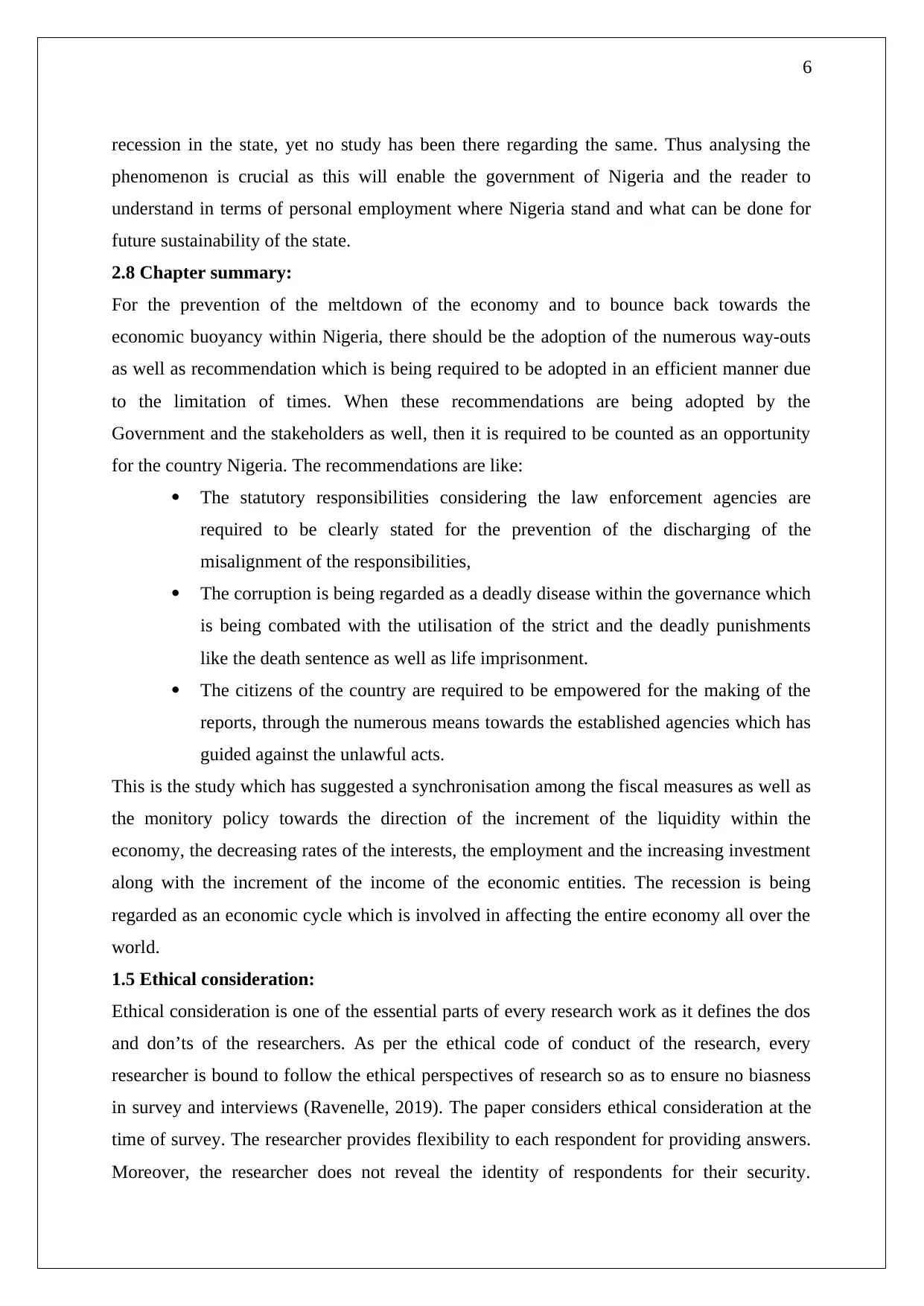
6
recession in the state, yet no study has been there regarding the same. Thus analysing the
phenomenon is crucial as this will enable the government of Nigeria and the reader to
understand in terms of personal employment where Nigeria stand and what can be done for
future sustainability of the state.
2.8 Chapter summary:
For the prevention of the meltdown of the economy and to bounce back towards the
economic buoyancy within Nigeria, there should be the adoption of the numerous way-outs
as well as recommendation which is being required to be adopted in an efficient manner due
to the limitation of times. When these recommendations are being adopted by the
Government and the stakeholders as well, then it is required to be counted as an opportunity
for the country Nigeria. The recommendations are like:
The statutory responsibilities considering the law enforcement agencies are
required to be clearly stated for the prevention of the discharging of the
misalignment of the responsibilities,
The corruption is being regarded as a deadly disease within the governance which
is being combated with the utilisation of the strict and the deadly punishments
like the death sentence as well as life imprisonment.
The citizens of the country are required to be empowered for the making of the
reports, through the numerous means towards the established agencies which has
guided against the unlawful acts.
This is the study which has suggested a synchronisation among the fiscal measures as well as
the monitory policy towards the direction of the increment of the liquidity within the
economy, the decreasing rates of the interests, the employment and the increasing investment
along with the increment of the income of the economic entities. The recession is being
regarded as an economic cycle which is involved in affecting the entire economy all over the
world.
1.5 Ethical consideration:
Ethical consideration is one of the essential parts of every research work as it defines the dos
and don’ts of the researchers. As per the ethical code of conduct of the research, every
researcher is bound to follow the ethical perspectives of research so as to ensure no biasness
in survey and interviews (Ravenelle, 2019). The paper considers ethical consideration at the
time of survey. The researcher provides flexibility to each respondent for providing answers.
Moreover, the researcher does not reveal the identity of respondents for their security.
recession in the state, yet no study has been there regarding the same. Thus analysing the
phenomenon is crucial as this will enable the government of Nigeria and the reader to
understand in terms of personal employment where Nigeria stand and what can be done for
future sustainability of the state.
2.8 Chapter summary:
For the prevention of the meltdown of the economy and to bounce back towards the
economic buoyancy within Nigeria, there should be the adoption of the numerous way-outs
as well as recommendation which is being required to be adopted in an efficient manner due
to the limitation of times. When these recommendations are being adopted by the
Government and the stakeholders as well, then it is required to be counted as an opportunity
for the country Nigeria. The recommendations are like:
The statutory responsibilities considering the law enforcement agencies are
required to be clearly stated for the prevention of the discharging of the
misalignment of the responsibilities,
The corruption is being regarded as a deadly disease within the governance which
is being combated with the utilisation of the strict and the deadly punishments
like the death sentence as well as life imprisonment.
The citizens of the country are required to be empowered for the making of the
reports, through the numerous means towards the established agencies which has
guided against the unlawful acts.
This is the study which has suggested a synchronisation among the fiscal measures as well as
the monitory policy towards the direction of the increment of the liquidity within the
economy, the decreasing rates of the interests, the employment and the increasing investment
along with the increment of the income of the economic entities. The recession is being
regarded as an economic cycle which is involved in affecting the entire economy all over the
world.
1.5 Ethical consideration:
Ethical consideration is one of the essential parts of every research work as it defines the dos
and don’ts of the researchers. As per the ethical code of conduct of the research, every
researcher is bound to follow the ethical perspectives of research so as to ensure no biasness
in survey and interviews (Ravenelle, 2019). The paper considers ethical consideration at the
time of survey. The researcher provides flexibility to each respondent for providing answers.
Moreover, the researcher does not reveal the identity of respondents for their security.
Paraphrase This Document
Need a fresh take? Get an instant paraphrase of this document with our AI Paraphraser
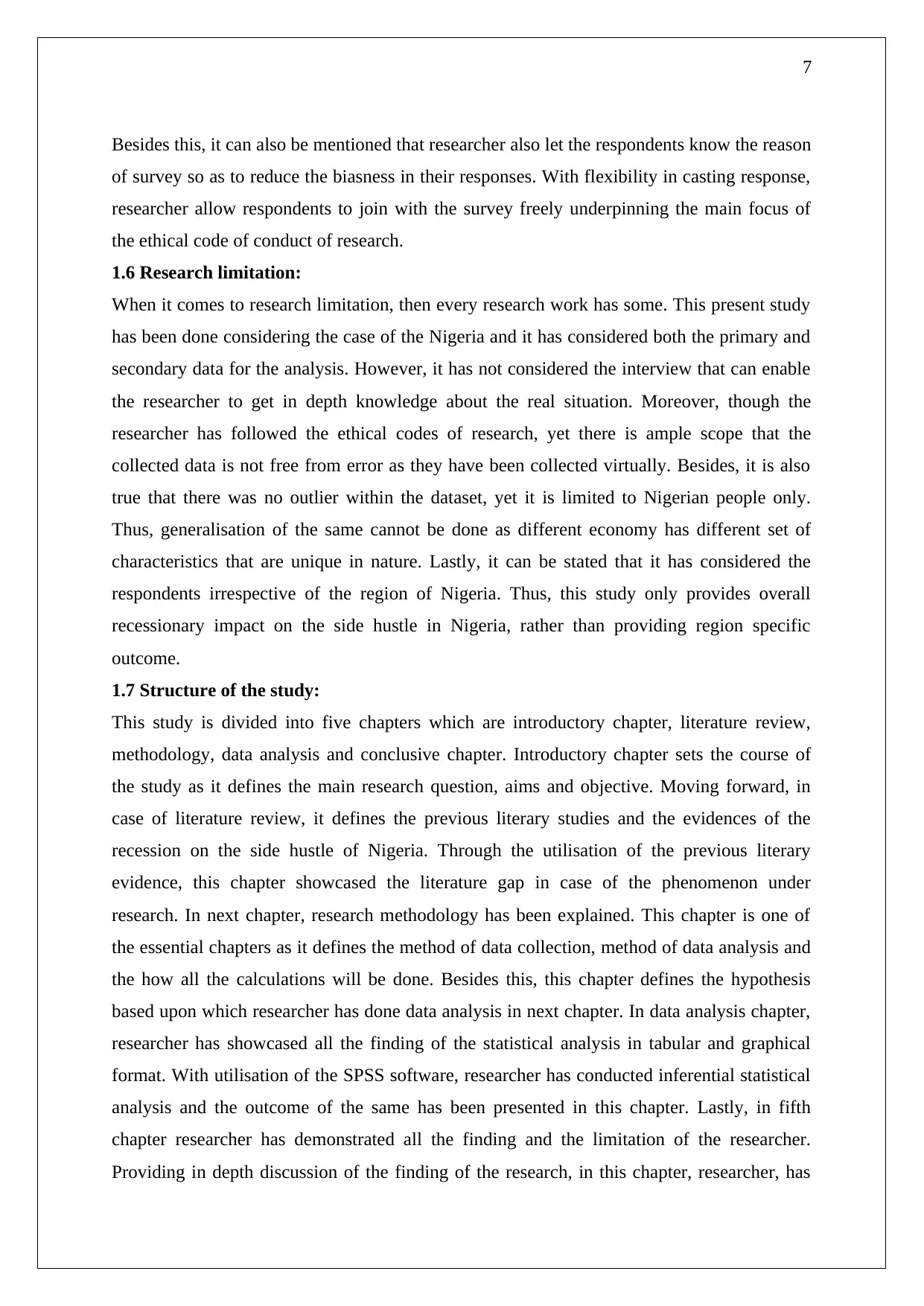
7
Besides this, it can also be mentioned that researcher also let the respondents know the reason
of survey so as to reduce the biasness in their responses. With flexibility in casting response,
researcher allow respondents to join with the survey freely underpinning the main focus of
the ethical code of conduct of research.
1.6 Research limitation:
When it comes to research limitation, then every research work has some. This present study
has been done considering the case of the Nigeria and it has considered both the primary and
secondary data for the analysis. However, it has not considered the interview that can enable
the researcher to get in depth knowledge about the real situation. Moreover, though the
researcher has followed the ethical codes of research, yet there is ample scope that the
collected data is not free from error as they have been collected virtually. Besides, it is also
true that there was no outlier within the dataset, yet it is limited to Nigerian people only.
Thus, generalisation of the same cannot be done as different economy has different set of
characteristics that are unique in nature. Lastly, it can be stated that it has considered the
respondents irrespective of the region of Nigeria. Thus, this study only provides overall
recessionary impact on the side hustle in Nigeria, rather than providing region specific
outcome.
1.7 Structure of the study:
This study is divided into five chapters which are introductory chapter, literature review,
methodology, data analysis and conclusive chapter. Introductory chapter sets the course of
the study as it defines the main research question, aims and objective. Moving forward, in
case of literature review, it defines the previous literary studies and the evidences of the
recession on the side hustle of Nigeria. Through the utilisation of the previous literary
evidence, this chapter showcased the literature gap in case of the phenomenon under
research. In next chapter, research methodology has been explained. This chapter is one of
the essential chapters as it defines the method of data collection, method of data analysis and
the how all the calculations will be done. Besides this, this chapter defines the hypothesis
based upon which researcher has done data analysis in next chapter. In data analysis chapter,
researcher has showcased all the finding of the statistical analysis in tabular and graphical
format. With utilisation of the SPSS software, researcher has conducted inferential statistical
analysis and the outcome of the same has been presented in this chapter. Lastly, in fifth
chapter researcher has demonstrated all the finding and the limitation of the researcher.
Providing in depth discussion of the finding of the research, in this chapter, researcher, has
Besides this, it can also be mentioned that researcher also let the respondents know the reason
of survey so as to reduce the biasness in their responses. With flexibility in casting response,
researcher allow respondents to join with the survey freely underpinning the main focus of
the ethical code of conduct of research.
1.6 Research limitation:
When it comes to research limitation, then every research work has some. This present study
has been done considering the case of the Nigeria and it has considered both the primary and
secondary data for the analysis. However, it has not considered the interview that can enable
the researcher to get in depth knowledge about the real situation. Moreover, though the
researcher has followed the ethical codes of research, yet there is ample scope that the
collected data is not free from error as they have been collected virtually. Besides, it is also
true that there was no outlier within the dataset, yet it is limited to Nigerian people only.
Thus, generalisation of the same cannot be done as different economy has different set of
characteristics that are unique in nature. Lastly, it can be stated that it has considered the
respondents irrespective of the region of Nigeria. Thus, this study only provides overall
recessionary impact on the side hustle in Nigeria, rather than providing region specific
outcome.
1.7 Structure of the study:
This study is divided into five chapters which are introductory chapter, literature review,
methodology, data analysis and conclusive chapter. Introductory chapter sets the course of
the study as it defines the main research question, aims and objective. Moving forward, in
case of literature review, it defines the previous literary studies and the evidences of the
recession on the side hustle of Nigeria. Through the utilisation of the previous literary
evidence, this chapter showcased the literature gap in case of the phenomenon under
research. In next chapter, research methodology has been explained. This chapter is one of
the essential chapters as it defines the method of data collection, method of data analysis and
the how all the calculations will be done. Besides this, this chapter defines the hypothesis
based upon which researcher has done data analysis in next chapter. In data analysis chapter,
researcher has showcased all the finding of the statistical analysis in tabular and graphical
format. With utilisation of the SPSS software, researcher has conducted inferential statistical
analysis and the outcome of the same has been presented in this chapter. Lastly, in fifth
chapter researcher has demonstrated all the finding and the limitation of the researcher.
Providing in depth discussion of the finding of the research, in this chapter, researcher, has
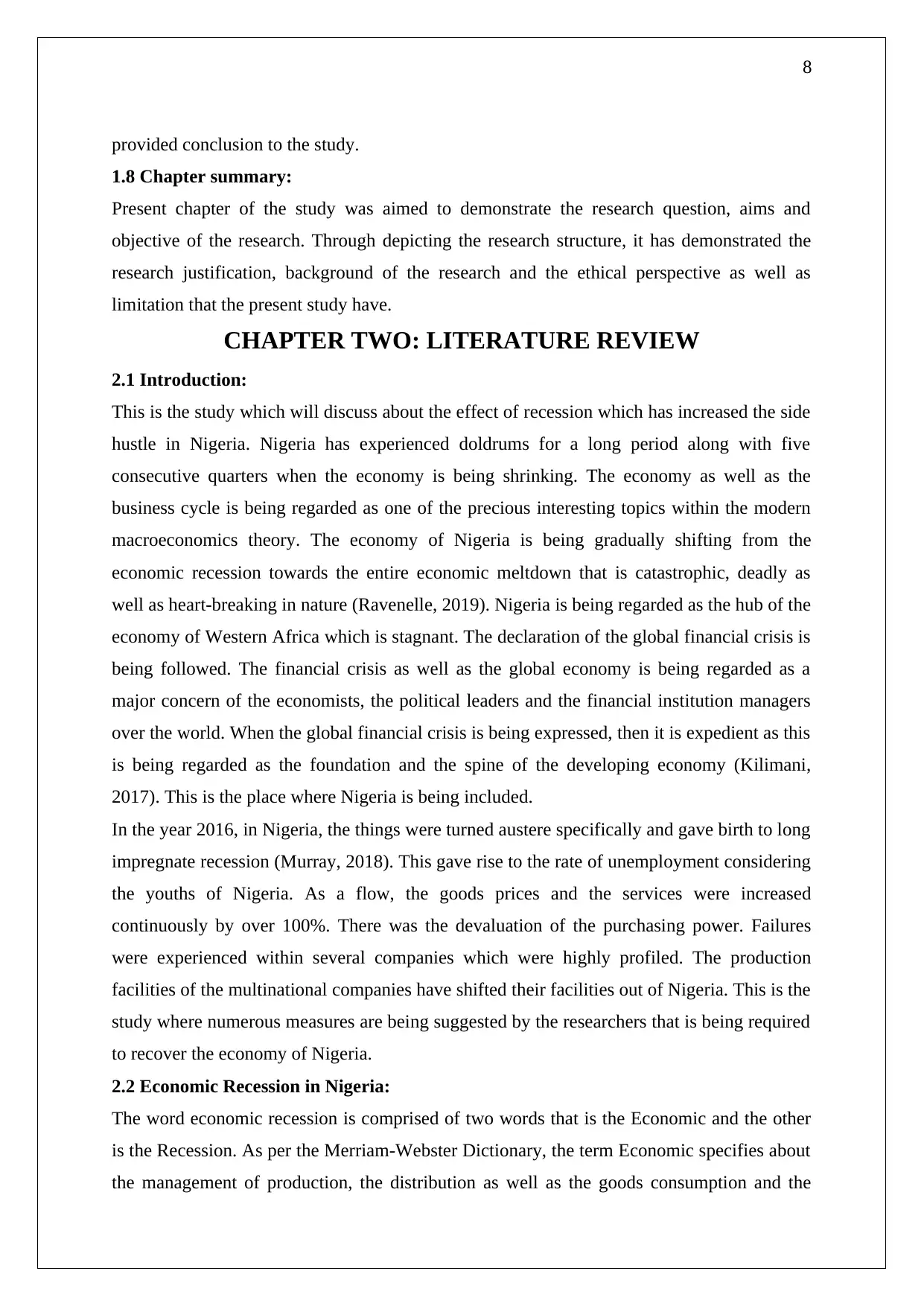
8
provided conclusion to the study.
1.8 Chapter summary:
Present chapter of the study was aimed to demonstrate the research question, aims and
objective of the research. Through depicting the research structure, it has demonstrated the
research justification, background of the research and the ethical perspective as well as
limitation that the present study have.
CHAPTER TWO: LITERATURE REVIEW
2.1 Introduction:
This is the study which will discuss about the effect of recession which has increased the side
hustle in Nigeria. Nigeria has experienced doldrums for a long period along with five
consecutive quarters when the economy is being shrinking. The economy as well as the
business cycle is being regarded as one of the precious interesting topics within the modern
macroeconomics theory. The economy of Nigeria is being gradually shifting from the
economic recession towards the entire economic meltdown that is catastrophic, deadly as
well as heart-breaking in nature (Ravenelle, 2019). Nigeria is being regarded as the hub of the
economy of Western Africa which is stagnant. The declaration of the global financial crisis is
being followed. The financial crisis as well as the global economy is being regarded as a
major concern of the economists, the political leaders and the financial institution managers
over the world. When the global financial crisis is being expressed, then it is expedient as this
is being regarded as the foundation and the spine of the developing economy (Kilimani,
2017). This is the place where Nigeria is being included.
In the year 2016, in Nigeria, the things were turned austere specifically and gave birth to long
impregnate recession (Murray, 2018). This gave rise to the rate of unemployment considering
the youths of Nigeria. As a flow, the goods prices and the services were increased
continuously by over 100%. There was the devaluation of the purchasing power. Failures
were experienced within several companies which were highly profiled. The production
facilities of the multinational companies have shifted their facilities out of Nigeria. This is the
study where numerous measures are being suggested by the researchers that is being required
to recover the economy of Nigeria.
2.2 Economic Recession in Nigeria:
The word economic recession is comprised of two words that is the Economic and the other
is the Recession. As per the Merriam-Webster Dictionary, the term Economic specifies about
the management of production, the distribution as well as the goods consumption and the
provided conclusion to the study.
1.8 Chapter summary:
Present chapter of the study was aimed to demonstrate the research question, aims and
objective of the research. Through depicting the research structure, it has demonstrated the
research justification, background of the research and the ethical perspective as well as
limitation that the present study have.
CHAPTER TWO: LITERATURE REVIEW
2.1 Introduction:
This is the study which will discuss about the effect of recession which has increased the side
hustle in Nigeria. Nigeria has experienced doldrums for a long period along with five
consecutive quarters when the economy is being shrinking. The economy as well as the
business cycle is being regarded as one of the precious interesting topics within the modern
macroeconomics theory. The economy of Nigeria is being gradually shifting from the
economic recession towards the entire economic meltdown that is catastrophic, deadly as
well as heart-breaking in nature (Ravenelle, 2019). Nigeria is being regarded as the hub of the
economy of Western Africa which is stagnant. The declaration of the global financial crisis is
being followed. The financial crisis as well as the global economy is being regarded as a
major concern of the economists, the political leaders and the financial institution managers
over the world. When the global financial crisis is being expressed, then it is expedient as this
is being regarded as the foundation and the spine of the developing economy (Kilimani,
2017). This is the place where Nigeria is being included.
In the year 2016, in Nigeria, the things were turned austere specifically and gave birth to long
impregnate recession (Murray, 2018). This gave rise to the rate of unemployment considering
the youths of Nigeria. As a flow, the goods prices and the services were increased
continuously by over 100%. There was the devaluation of the purchasing power. Failures
were experienced within several companies which were highly profiled. The production
facilities of the multinational companies have shifted their facilities out of Nigeria. This is the
study where numerous measures are being suggested by the researchers that is being required
to recover the economy of Nigeria.
2.2 Economic Recession in Nigeria:
The word economic recession is comprised of two words that is the Economic and the other
is the Recession. As per the Merriam-Webster Dictionary, the term Economic specifies about
the management of production, the distribution as well as the goods consumption and the
⊘ This is a preview!⊘
Do you want full access?
Subscribe today to unlock all pages.

Trusted by 1+ million students worldwide
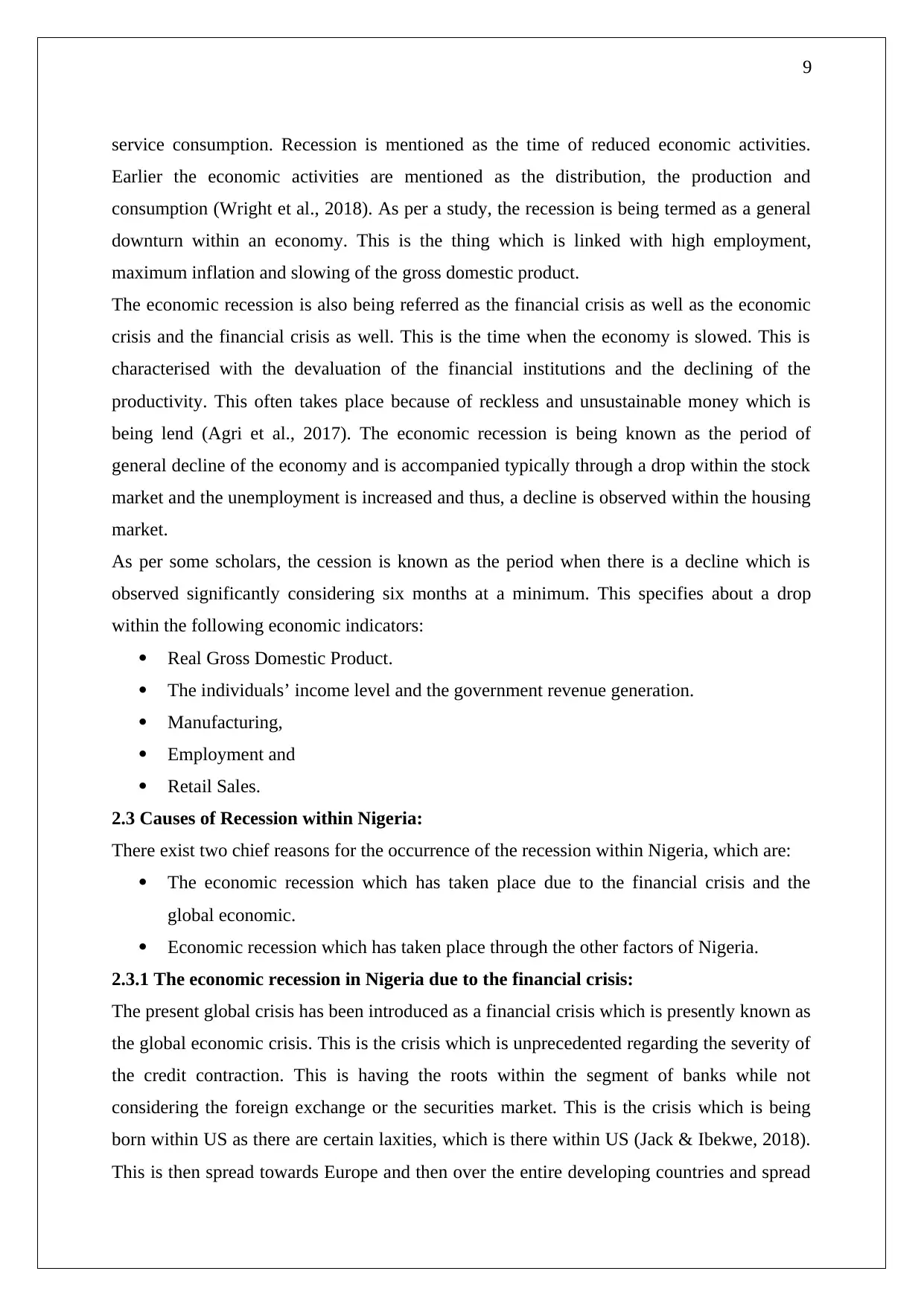
9
service consumption. Recession is mentioned as the time of reduced economic activities.
Earlier the economic activities are mentioned as the distribution, the production and
consumption (Wright et al., 2018). As per a study, the recession is being termed as a general
downturn within an economy. This is the thing which is linked with high employment,
maximum inflation and slowing of the gross domestic product.
The economic recession is also being referred as the financial crisis as well as the economic
crisis and the financial crisis as well. This is the time when the economy is slowed. This is
characterised with the devaluation of the financial institutions and the declining of the
productivity. This often takes place because of reckless and unsustainable money which is
being lend (Agri et al., 2017). The economic recession is being known as the period of
general decline of the economy and is accompanied typically through a drop within the stock
market and the unemployment is increased and thus, a decline is observed within the housing
market.
As per some scholars, the cession is known as the period when there is a decline which is
observed significantly considering six months at a minimum. This specifies about a drop
within the following economic indicators:
Real Gross Domestic Product.
The individuals’ income level and the government revenue generation.
Manufacturing,
Employment and
Retail Sales.
2.3 Causes of Recession within Nigeria:
There exist two chief reasons for the occurrence of the recession within Nigeria, which are:
The economic recession which has taken place due to the financial crisis and the
global economic.
Economic recession which has taken place through the other factors of Nigeria.
2.3.1 The economic recession in Nigeria due to the financial crisis:
The present global crisis has been introduced as a financial crisis which is presently known as
the global economic crisis. This is the crisis which is unprecedented regarding the severity of
the credit contraction. This is having the roots within the segment of banks while not
considering the foreign exchange or the securities market. This is the crisis which is being
born within US as there are certain laxities, which is there within US (Jack & Ibekwe, 2018).
This is then spread towards Europe and then over the entire developing countries and spread
service consumption. Recession is mentioned as the time of reduced economic activities.
Earlier the economic activities are mentioned as the distribution, the production and
consumption (Wright et al., 2018). As per a study, the recession is being termed as a general
downturn within an economy. This is the thing which is linked with high employment,
maximum inflation and slowing of the gross domestic product.
The economic recession is also being referred as the financial crisis as well as the economic
crisis and the financial crisis as well. This is the time when the economy is slowed. This is
characterised with the devaluation of the financial institutions and the declining of the
productivity. This often takes place because of reckless and unsustainable money which is
being lend (Agri et al., 2017). The economic recession is being known as the period of
general decline of the economy and is accompanied typically through a drop within the stock
market and the unemployment is increased and thus, a decline is observed within the housing
market.
As per some scholars, the cession is known as the period when there is a decline which is
observed significantly considering six months at a minimum. This specifies about a drop
within the following economic indicators:
Real Gross Domestic Product.
The individuals’ income level and the government revenue generation.
Manufacturing,
Employment and
Retail Sales.
2.3 Causes of Recession within Nigeria:
There exist two chief reasons for the occurrence of the recession within Nigeria, which are:
The economic recession which has taken place due to the financial crisis and the
global economic.
Economic recession which has taken place through the other factors of Nigeria.
2.3.1 The economic recession in Nigeria due to the financial crisis:
The present global crisis has been introduced as a financial crisis which is presently known as
the global economic crisis. This is the crisis which is unprecedented regarding the severity of
the credit contraction. This is having the roots within the segment of banks while not
considering the foreign exchange or the securities market. This is the crisis which is being
born within US as there are certain laxities, which is there within US (Jack & Ibekwe, 2018).
This is then spread towards Europe and then over the entire developing countries and spread
Paraphrase This Document
Need a fresh take? Get an instant paraphrase of this document with our AI Paraphraser
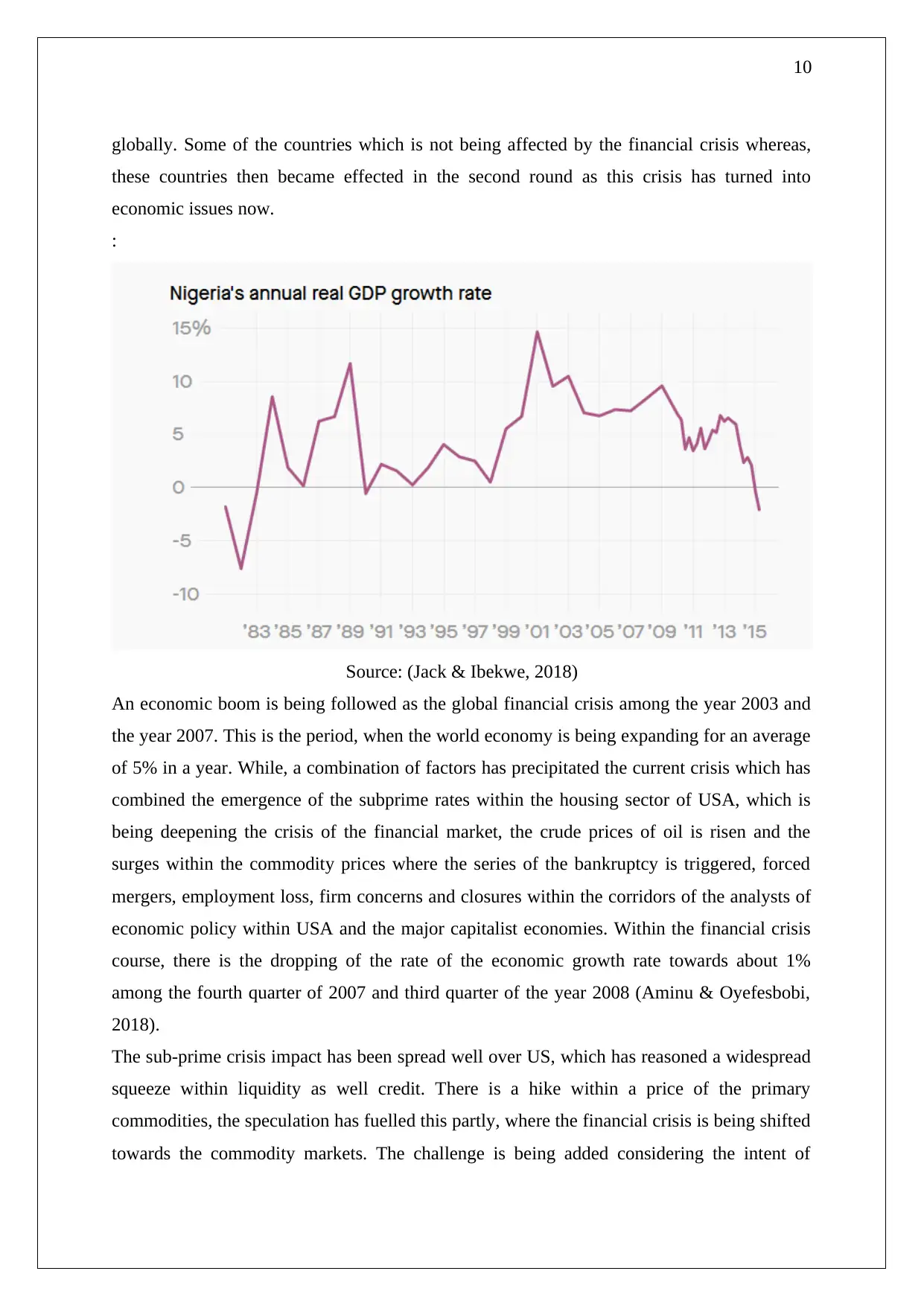
10
globally. Some of the countries which is not being affected by the financial crisis whereas,
these countries then became effected in the second round as this crisis has turned into
economic issues now.
:
Source: (Jack & Ibekwe, 2018)
An economic boom is being followed as the global financial crisis among the year 2003 and
the year 2007. This is the period, when the world economy is being expanding for an average
of 5% in a year. While, a combination of factors has precipitated the current crisis which has
combined the emergence of the subprime rates within the housing sector of USA, which is
being deepening the crisis of the financial market, the crude prices of oil is risen and the
surges within the commodity prices where the series of the bankruptcy is triggered, forced
mergers, employment loss, firm concerns and closures within the corridors of the analysts of
economic policy within USA and the major capitalist economies. Within the financial crisis
course, there is the dropping of the rate of the economic growth rate towards about 1%
among the fourth quarter of 2007 and third quarter of the year 2008 (Aminu & Oyefesbobi,
2018).
The sub-prime crisis impact has been spread well over US, which has reasoned a widespread
squeeze within liquidity as well credit. There is a hike within a price of the primary
commodities, the speculation has fuelled this partly, where the financial crisis is being shifted
towards the commodity markets. The challenge is being added considering the intent of
globally. Some of the countries which is not being affected by the financial crisis whereas,
these countries then became effected in the second round as this crisis has turned into
economic issues now.
:
Source: (Jack & Ibekwe, 2018)
An economic boom is being followed as the global financial crisis among the year 2003 and
the year 2007. This is the period, when the world economy is being expanding for an average
of 5% in a year. While, a combination of factors has precipitated the current crisis which has
combined the emergence of the subprime rates within the housing sector of USA, which is
being deepening the crisis of the financial market, the crude prices of oil is risen and the
surges within the commodity prices where the series of the bankruptcy is triggered, forced
mergers, employment loss, firm concerns and closures within the corridors of the analysts of
economic policy within USA and the major capitalist economies. Within the financial crisis
course, there is the dropping of the rate of the economic growth rate towards about 1%
among the fourth quarter of 2007 and third quarter of the year 2008 (Aminu & Oyefesbobi,
2018).
The sub-prime crisis impact has been spread well over US, which has reasoned a widespread
squeeze within liquidity as well credit. There is a hike within a price of the primary
commodities, the speculation has fuelled this partly, where the financial crisis is being shifted
towards the commodity markets. The challenge is being added considering the intent of
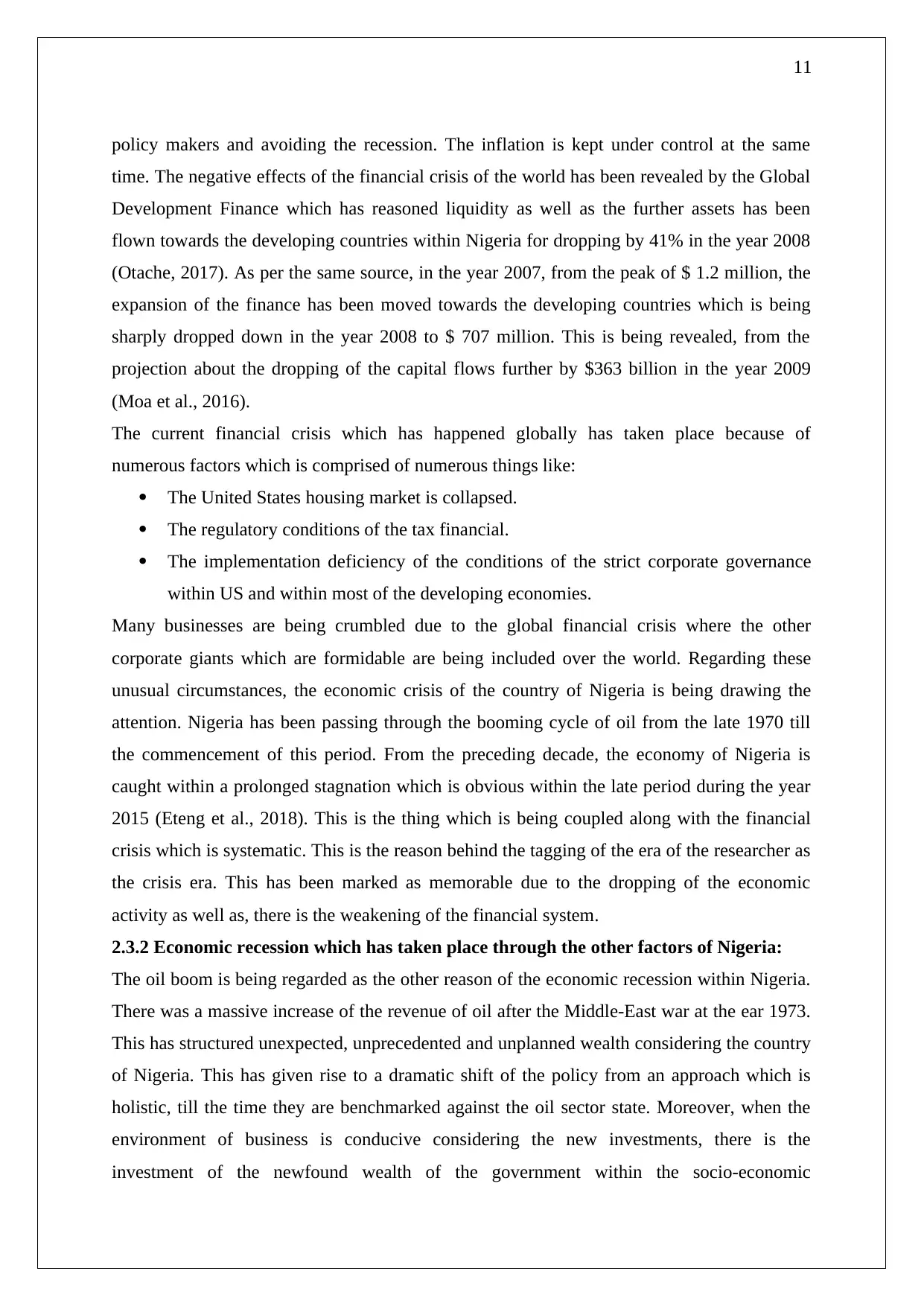
11
policy makers and avoiding the recession. The inflation is kept under control at the same
time. The negative effects of the financial crisis of the world has been revealed by the Global
Development Finance which has reasoned liquidity as well as the further assets has been
flown towards the developing countries within Nigeria for dropping by 41% in the year 2008
(Otache, 2017). As per the same source, in the year 2007, from the peak of $ 1.2 million, the
expansion of the finance has been moved towards the developing countries which is being
sharply dropped down in the year 2008 to $ 707 million. This is being revealed, from the
projection about the dropping of the capital flows further by $363 billion in the year 2009
(Moa et al., 2016).
The current financial crisis which has happened globally has taken place because of
numerous factors which is comprised of numerous things like:
The United States housing market is collapsed.
The regulatory conditions of the tax financial.
The implementation deficiency of the conditions of the strict corporate governance
within US and within most of the developing economies.
Many businesses are being crumbled due to the global financial crisis where the other
corporate giants which are formidable are being included over the world. Regarding these
unusual circumstances, the economic crisis of the country of Nigeria is being drawing the
attention. Nigeria has been passing through the booming cycle of oil from the late 1970 till
the commencement of this period. From the preceding decade, the economy of Nigeria is
caught within a prolonged stagnation which is obvious within the late period during the year
2015 (Eteng et al., 2018). This is the thing which is being coupled along with the financial
crisis which is systematic. This is the reason behind the tagging of the era of the researcher as
the crisis era. This has been marked as memorable due to the dropping of the economic
activity as well as, there is the weakening of the financial system.
2.3.2 Economic recession which has taken place through the other factors of Nigeria:
The oil boom is being regarded as the other reason of the economic recession within Nigeria.
There was a massive increase of the revenue of oil after the Middle-East war at the ear 1973.
This has structured unexpected, unprecedented and unplanned wealth considering the country
of Nigeria. This has given rise to a dramatic shift of the policy from an approach which is
holistic, till the time they are benchmarked against the oil sector state. Moreover, when the
environment of business is conducive considering the new investments, there is the
investment of the newfound wealth of the government within the socio-economic
policy makers and avoiding the recession. The inflation is kept under control at the same
time. The negative effects of the financial crisis of the world has been revealed by the Global
Development Finance which has reasoned liquidity as well as the further assets has been
flown towards the developing countries within Nigeria for dropping by 41% in the year 2008
(Otache, 2017). As per the same source, in the year 2007, from the peak of $ 1.2 million, the
expansion of the finance has been moved towards the developing countries which is being
sharply dropped down in the year 2008 to $ 707 million. This is being revealed, from the
projection about the dropping of the capital flows further by $363 billion in the year 2009
(Moa et al., 2016).
The current financial crisis which has happened globally has taken place because of
numerous factors which is comprised of numerous things like:
The United States housing market is collapsed.
The regulatory conditions of the tax financial.
The implementation deficiency of the conditions of the strict corporate governance
within US and within most of the developing economies.
Many businesses are being crumbled due to the global financial crisis where the other
corporate giants which are formidable are being included over the world. Regarding these
unusual circumstances, the economic crisis of the country of Nigeria is being drawing the
attention. Nigeria has been passing through the booming cycle of oil from the late 1970 till
the commencement of this period. From the preceding decade, the economy of Nigeria is
caught within a prolonged stagnation which is obvious within the late period during the year
2015 (Eteng et al., 2018). This is the thing which is being coupled along with the financial
crisis which is systematic. This is the reason behind the tagging of the era of the researcher as
the crisis era. This has been marked as memorable due to the dropping of the economic
activity as well as, there is the weakening of the financial system.
2.3.2 Economic recession which has taken place through the other factors of Nigeria:
The oil boom is being regarded as the other reason of the economic recession within Nigeria.
There was a massive increase of the revenue of oil after the Middle-East war at the ear 1973.
This has structured unexpected, unprecedented and unplanned wealth considering the country
of Nigeria. This has given rise to a dramatic shift of the policy from an approach which is
holistic, till the time they are benchmarked against the oil sector state. Moreover, when the
environment of business is conducive considering the new investments, there is the
investment of the newfound wealth of the government within the socio-economic
⊘ This is a preview!⊘
Do you want full access?
Subscribe today to unlock all pages.

Trusted by 1+ million students worldwide
1 out of 72
Related Documents
Your All-in-One AI-Powered Toolkit for Academic Success.
+13062052269
info@desklib.com
Available 24*7 on WhatsApp / Email
![[object Object]](/_next/static/media/star-bottom.7253800d.svg)
Unlock your academic potential
Copyright © 2020–2026 A2Z Services. All Rights Reserved. Developed and managed by ZUCOL.





